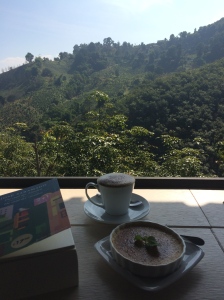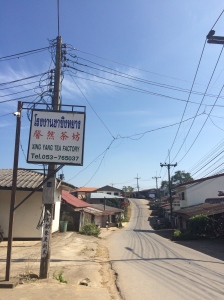Part 1: Mother tongue
December, winter in Thailand. It is a sunny day with a pristine blue sky, but it is chilly in Mae Salong. All sorts of greenery is reflecting from the mountain sides, curvy and windy roads provide fun during the ride. This is the perfect motorbike ‘getaway’.
Mae Salong is a Chinese settlement in the far north of Thailand, close to the Burmese border. The village consists mainly of Chinese ‘Kuomintang’, who fled China in the late 1940’s. They wanted to fight the communist regime, but that turned out to be quite hard from within China. So they settled in the Thai mountains of the north. Life was cold and rough and there was more to life then just fighting the regime, so the villagers looked for a lucrative way of spending their time (when they were not fighting the system).
Chinese have been well-reputed businessmen for thousands of years, not without reason. The Kuomintang decided to get involved in the opium business. The cold, rough but sunny mountainous climate appeared to be perfect for growing opium. Moreover, because of being located so close to Laos, Burma and China with the Mekong river at the feet of the mountains, it would be easy to trade (‘smuggle’) with and through the neighboring countries.
This was not just the cunning plan of the Kuomintang, but basically every living soul in the area at that time. And what about the Thai authorities? How did they react upon the arrival of the Chinese and a bit later, their ambitious business plans? ‘Mai pen rai’, the authorities and surrounding hill tribes thought. They were happy that finally someone was brave enough to fight the communists, something they had been trying to do for a long time. ‘The more, the merrier’, they thought! And that whole opium business? The friendly and ever-smiling Thai didn’t want to upset their new allies. ‘Let’s just ignore that opium stuff’ (as long as we get to smoke from time to time).
Things changed dramatically in the 1980’s, but hey, that’s 30 years later and a different story.
The Kuomintang are still numerous nowadays in Mae Salong, but they shifted their business from opium to tea and coffee, hence all the tea houses up and down the main road. Interesting detail: Mae Salong has got a church, a mosque and a variety of temples that represent a variety of religions. And no terrorists.
I decided Mae Salong was interesting and authentic enough to spend a day and a night (a night that only cost me 100 THB, just sayin’..). I parked my bike, checked in and went for a walk, a walk that soon caused great confusion in my language-sensitive head. All signs were written in Thai, Chinese and sometimes Burmese.
English is no longer a ‘lingua franca’ in this region, so I tried my limited Thai vocabulary on a few locals. Not the most successful attempt: either they spoke Chinese or a local dialect, as is the case with all hill tribes up here: Lisu, Lahu, Karen. You name it, I cannot understand a word.
This peculiar language situation reminds me very much of Flanders, Belgium, my own Hinterland.
Yes, I am Belgian, but guessing what my mother tongue is, would be a tricky thing to do. It could be either French, German or Dutch. It’s the last one, but I also speak the other two. This multilingualism can be most amusing when I overhear conversations in one of the former mentioned languages and people are convinced no one understands them. The rudeness!
Belgium’s linguistic history is too complex and too incomprehensible for a normal human being, I will not elaborate on this. To cut things short: I come from a region where people would punch each other in the face – hang on, that’s an understatement: where people would KILL – when the wrong language has been used. So far I never got killed, but things could change dramatically after I have published this column.
My mother tongue is Dutch, but here’s the thing: I read books in 4 different languages, I write and think in English most of the time, I love speaking French with one of my colleagues, ‘hello’ naturally became ‘sabaidee kha’ (Thai for ‘hello’) since I live in Thailand. Does this mean I am losing my mother tongue? No. On the contrary, Dutch is my ‘foundation’, as a matter of speaking. I know my grammar and spelling, I have a broad vocabulary. All of these mother tongue aspects help me to be more proficient in the other languages I use. It also helps me to understand the complex language situation in the Mae Salong region.
If you would ask some of the students in our international school about their mother tongue, your question would be followed by a long silence. Some of them wouldn’t know. They grew up in international boarding schools, have switched countries (and thus languages) numerous times, they do not spend a lot of time with their families who speak their first language. Mother tongue becomes a very abstract and even non-existent thing for them. Language is a melting pot, a ‘ratatouille’, to use a French word. Anything wrong with that? At first sight, I would say no. Language purism is a very outdated concept. Because we travel, we mingle and we even enrich languages by mixing them. But if you look at these student’s language awareness more closely, there is a downside. Their house has no foundation. Often, there is not one language they master really well. Their proficiency is average in all the languages they use: poor writing in one, bad reading in another, scattered speaking in a third.
Am I predicting the death of mother tongues? I am not sure. We are still far away from that point, but we travel. We mingle. We move to different places. Although fundamentalists of all sorts would like to see things differently, our cultures and languages and traditions become a more symbiotic whole.
I am just taking a giant leap into the future when there would be the possibility of one big ‘monolingual symbiotic mother language’. This reminds me very much of the film ‘Code 46’, that dares to go more than one step further than I do.
As long as there is religion, people will still have enough to fight for.
I am not pleading for a long lost paradise where we only master one language. I am pleading for language awareness and education as a strong foundation to become a proficient ‘multi-lingualist’.
I still dream in Dutch. If I wouldn’t have a mother tongue anymore, would I then dream in different languages or would my dreams be speechless?
Part 2: Modern
Mae Salong has got a very rural and authentic look, except for one little place on the main road, called ‘Sweet Mae Salong’. This is a ‘hipster proof’ cafe that serves great cappuccino.
I fell into the trap of the hipster place. Mea Culpa, just to save my soul : I eat rice with the locals, go shopping in the local market, don’t stay in places that have the word ‘resort’ in it, explore dusty roads where tourists don’t come and shake hands with the elderly guy at the gas station. My motorbike is a 30 year old Honda with a Lifan engine and an eclectic collection of spare parts.
But I drink cappuccino in the hipster place..
This cafe is a little off the wall in the middle of one of the most rural parts of Thailand.
It is a fact that none of the villagers have ever set foot in the cafe. They probably look at it with a little suspicion or maybe even disbelief. As if they would have seen Elvis alive and kicking.
The cappuccino is creamy, the creme brûlée of fine quality. It makes me forget the dusty mountain roads for just a while.
There is no doubt that the villagers would ever set foot in this place. ‘Farangs’ (Western people), on the contrary, hurry inside to get a seat that overlooks the valley. While I am sipping from my cappuccino staring at my dusty bike boots, 2 families, clearly from the U.S. of A, are entering the premises.
The families are from the sort that uses the word ‘like’ at least once in every sentence. You would wonder how and why these people end up in a settlement like Mae Salong. Why do they drive all the way up into the mountains (with their Toyota Fortuner) to visit a remote and dusty village that is rather difficult to access? Easy: these people are expats, living in Bangkok. They celebrate Christmas with visiting friends or family. Bangkok is exotic, but not exotic enough anymore. They want to show their visitors the ‘real’ Thailand, where people still live ‘like’ hundred’s of years ago. So they decide to take their four wheel drive up the mountains. They stay in the one resort that Mae Salong has to be able to wash the dust off their faces a few times a day with white towels that have the resort logo embroidered on them. They visit the temple on top of the mountain, so they can use all the lenses they bought together with their expensive Nikon camera. They also drink cappuccino in ’Sweet Mae Salong’.
Ordering coffees goes in convincing American English. These people still have a mother tongue and proud of it! In this case, their language is the symbol of their arrogance.**
The families wear Gucci flip flops, Festina watches, expensive linen shirts and they ‘hashtag’ every move they make. This is not product placement, I am afraid this is reality.
While the families marvel over their cappuccinos, I stare even more intense at my dusty bike boots and I feel deep shame. I pay my coffee and creme brûlée, get out as fast as I can and walk down the road onto a dusty path that goes down, straight into the woods.
** For the record: this column has been proofread by an American, but not a ‘pure blood’ one: an American with Italian roots who has been living in Thailand for more than 12 years and is fluent in Thai. In his case, his English is not a symbol of his arrogance, on the contrary. He wears his mother tongue as a humble cloak.
Cappuccino and crème brûlée in Sweet Mae Salong
Tea and coffee in the hills of Mae Salong
Thai – Chinese signs in Mae Salong



